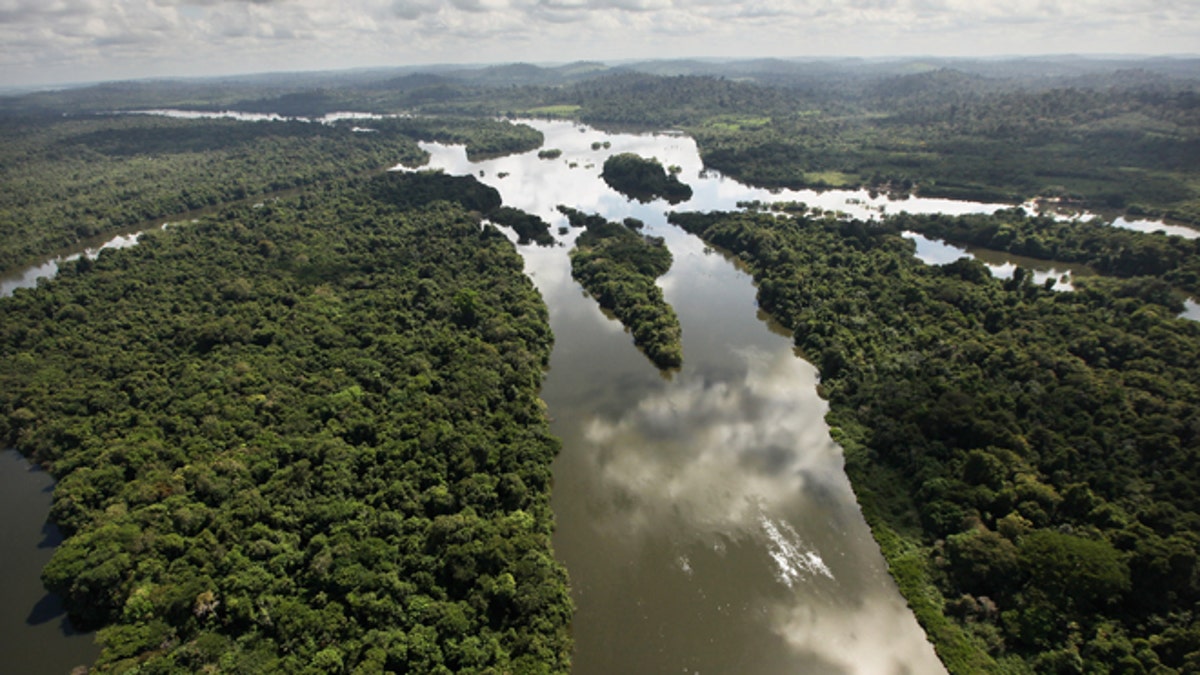
NEAR ALTAMIRA, BRAZIL - JUNE 15: The Xingu River flows near the area where the Belo Monte dam complex is under construction in the Amazon basin on June 15, 2012 near Altamira, Brazil. Belo Monte will be the worldâs third-largest hydroelectric project and will displace up to 20,000 people while diverting the Xingu River and flooding as much as 230 square miles of rainforest. The controversial project is one of around 60 hydroelectric projects Brazil has planned in the Amazon to generate electricity for its rapidly expanding economy. While environmentalists and indigenous groups oppose the dam, many Brazilians support the project. The Brazilian Amazon, home to 60 percent of the worldâs largest forest and 20 percent of the Earthâs oxygen, remains threatened by the rapid development of the country. The area is currently populated by over 20 million people and is challenged by deforestation, agriculture, mining, a governmental dam building spree, illegal land speculation including the occupation of forest reserves and indigenous land and other issues. Over 100 heads of state and tens of thousands of participants and protesters will descend on Rio de Janeiro, Brazil, later this month for the Rio+20 United Nations Conference on Sustainable Development or âEarth Summitâ. Host Brazil is caught up in its own dilemma between accelerated growth and environmental preservation. (Photo by Mario Tama/Getty Images) (2012 Getty Images)
The promise of a peace deal between the Colombian government and the Revolutionary Armed Forces of Colombia (FARC) guerrilla group has given hope to scientists that they will be able conduct new research on the many rare insects and plants that call the country’s deep jungle their home.
For decades, constant fighting between the Colombian military and rebel groups have prevented scientists from spending time in the jungle zones amid fears of kidnapping or death. But now, as the two sides near a historic peace agreement, scientists are eyeing the region with eagerness.
"When you look at the map of Colombia in terms of biodiversity, you see incredible gaps,” Brigitte Baptiste, a biologist and director of the Humboldt Institute, a Colombian research group, told AFP. "That clearly reflects the difficulties researchers have in moving around."
Baptiste, who once was shot at in the Amazonian portion of the country while conducting research near a cocaine factory she didn't realize was there, said that some of her colleagues have been less lucky than her.
Two students, Margarita Gómez and Mateo Matamala, were killed by a gang in 2011 while researching in swamps in the north.
"Sometimes researchers are a bit too daring," Baptiste said. "They fail to judge the risk and don't take account of the fact that the country is in a serious armed conflict."
But with peace after more than 50 years of civil conflict seemingly in sight, scientists are hoping to be able to explore more in depth one of the most biologically diverse regions in the world.
"That offers a lot of opportunities for science," said Alejandro Olaya, vice president of the state science institute, Colciencias.
On area of interest is the Darien Gap – a remote jungle region that connects Colombia with Panama. María Angela Echeverry, head of the conservation program at Javeriana University in Bogotá, believes that this region holds many of the answers to how fauna moved between Central and South America,
The Colombian government has already planned 22 different expeditions to unexplored parts of the country and hopes to map out a complete national inventory of the country's ecosystems. There is also hope that the new research will lead to the discovery of natural products that can be sold to cosmetic and pharmaceutical companies.
While there are hurdles still to be crossed – prevention of development and illegal gold mining, the demobilization of guerrilla fighters – scientists believe that they can help with the peace process by using demobilized guerrillas for their knowledge of the jungle and mountain areas as well as in the fields of tourism, forest management and fishing.
Whatever happens scientists see major developments from any type of peace deal in Colombia.
"The biggest surprise that awaits us is in plants and insects," Echeverry said. "We are convinced that 60 percent of the species on the planet have yet to be discovered, and most of them are in the tropics."
